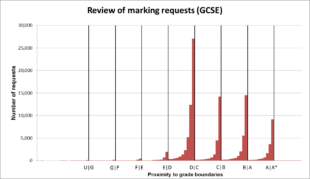As our consultation for changes in the Enquiries about Results and appeals system draws to a close, I want to reflect on the rationale for this important piece of work and what will happen next.
First, some context. About 4.8 million GCSE, 1.2 million AS level and 780,000 A levels were awarded in England in summer 2015. Against this backdrop, there were about 570,000 Enquiries about Results across all these qualifications, resulting in around 90,000 grade changes. This translates into about 1.1% of all GCSE, AS and A level qualification grades being changed.
We know from research that many of the marking review enquiries received by exam boards are for results that sit just below a grade boundary. The graph below illustrates this using data for GCSE enquiries in 2014.
Source: AQA
There are a number of reasons why review requests may follow this pattern. Among these, the current enquiries system, combined with accountability pressures, encourages enquiries to be made when marks fall just below a grade boundary. This is because it is known that there is a chance a higher mark will be given, even where the original mark was legitimate, as a very small change in mark may lead to a grade change.
Unfortunately some marking errors are inevitable in a system of such scale and these errors need to be identified and corrected swiftly. However, the research that informs our consultation tells us that perfectly reasonable marks are currently being changed on enquiry. This could lead to some candidates to gain an unfair advantage over candidates who do not submit an enquiry. It is this inequity we seek to remove. We have therefore proposed that in future reviewers should only be permitted to change marks that could not reasonably have been given. In all other cases the original mark must stand.
Quality of marking
You will recognise from this description that we make a clear distinction between reasonable differences in professional judgement and the quality of marking. Some commentators attempt to infer from the published data that an increase in mark enquiries reflects a deterioration in the quality of marking, but this is not necessarily so. For example, we have data showing that 60-70% of qualification grade changes are a result of very small mark changes, of less than three marks.
With this is mind, I am always disappointed to see sensational soundbites with regard to marking in England, such as ‘A system in crisis’ and ‘A cottage industry.’ There is certainly a system, it consists of more than 50,000 markers, most of whom are experienced teachers. And it is certainly an industry, but I would not use the word ‘cottage’ to describe the assessment of around 15 million papers and the associated marking of over 100 million questions.
That is not to suggest we consider the quality of marking to be perfect. Indeed, we seek continual improvement from exam boards and have a range of ongoing analyses designed to evaluate and monitor this. But it was not the rationale for our consultation.
So what have we proposed by way of other changes to the marking review system in addition to the proposal above? There are three main areas (summarised in this infographic): the need for specific training and, importantly, monitoring of reviewers, which does not happen at present; extending the grounds for appeal to include an unreasonable application of the exam board’s mark scheme; and extending access to marked scripts to include GCSEs. Together, they form an important set of proposals.
We have already received responses from a large number of associations, schools, colleges and individuals. We are pleased also that well over 1,300 students have completed our concise version of the consultation questions; we value this important input. And we would welcome any further comments by the end of today (Friday 11 March). We will then begin analysing these responses before considering the changes we believe should be made and the timescales involved. We know you will want to understand any changes we plan to make ahead of the summer awarding series and we are committed to announce our decisions as soon as possible
